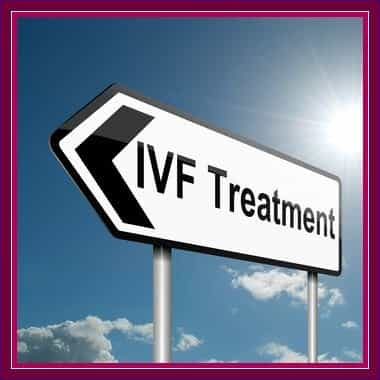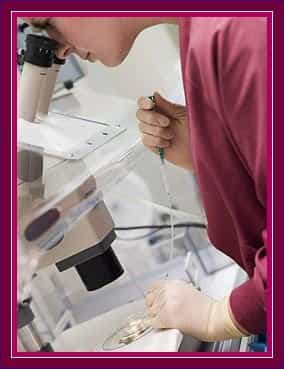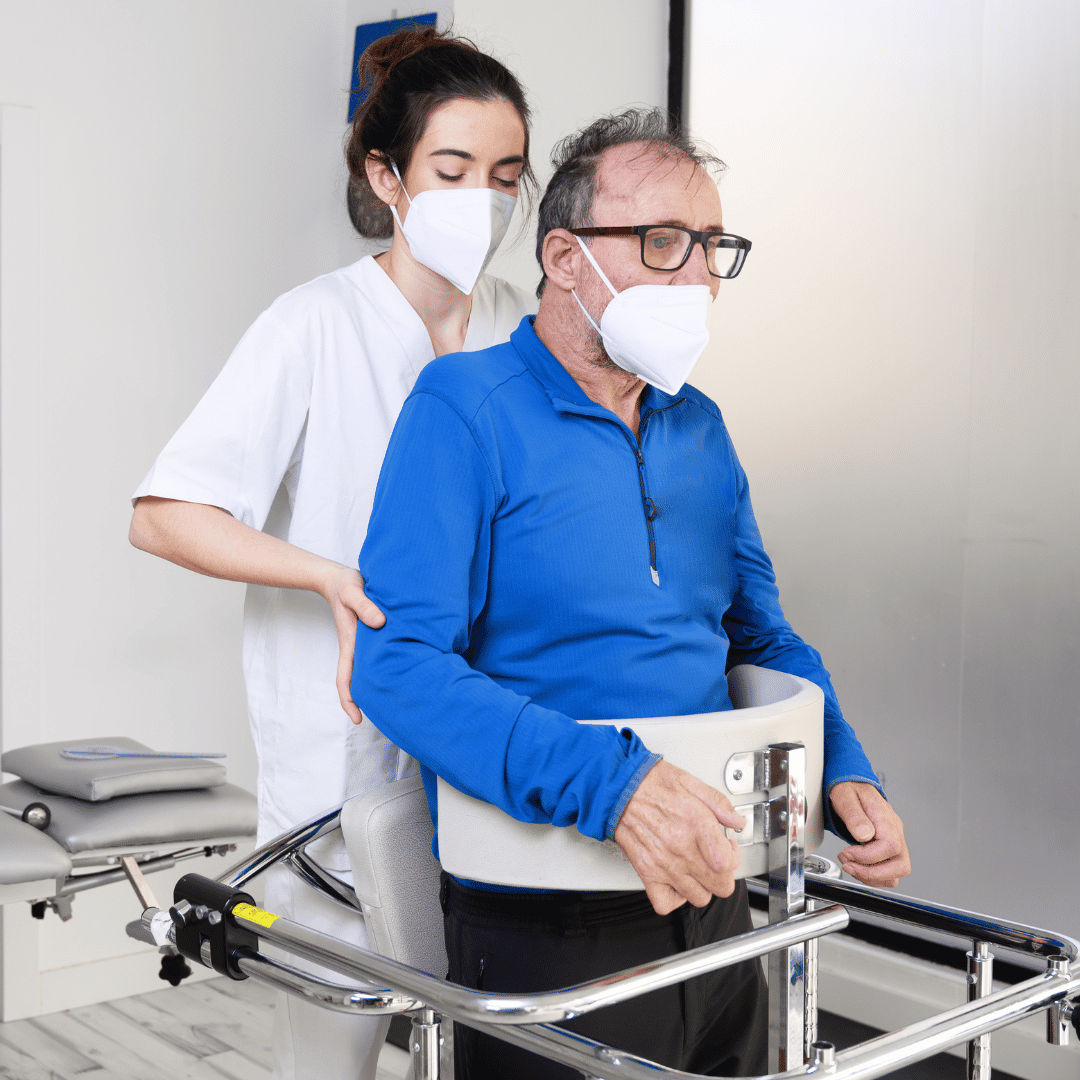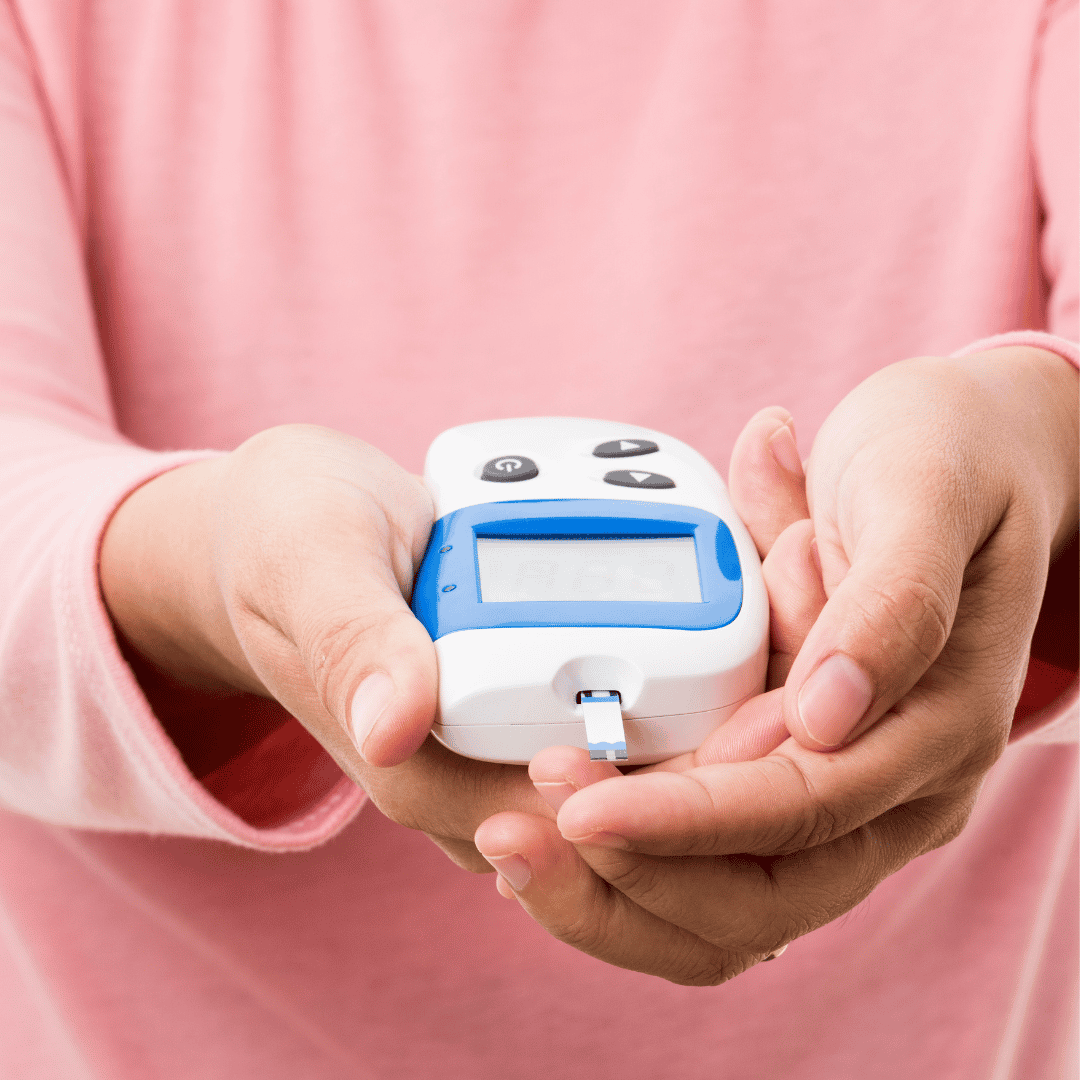Polycystic ovary syndrome (PCOS)

Might Cause Infertility
What is polycystic ovary syndrome (PCOS)?
Polycystic ovary syndrome (or PCOS) is a common hormonal disorder among women of reproductive age, affecting as many as 1 out of 15 women. Often the symptoms begin in the teen years of life.
The appearance of the ovaries is enlarged and containing numerous small cysts located along the outer edge of each ovary. That is why it is called polycystic ovary syndrome. The cysts are not harmful but lead to hormone imbalances.
The exact cause of polycystic ovary syndrome is unknown. Early diagnosis and treatment may reduce the risk of long-term complications, such as type 2 diabetes and heart disease.

 What are hormones imbalance, and what happens in PCOS?
What are hormones imbalance, and what happens in PCOS?
- Normally, the ovaries make a tiny amount of male sex hormones (androgens). In PCOS, they start making more androgens. This may cause to stop ovulating, get acne, and grow extra facial and body hair.
- The body may have a problem using insulin, called insulin resistance. When the body doesn't use insulin well, blood sugar levels go up. Over time, this increases chance of getting diabetes.

What are the symptoms of PCOS?
PCOS affects many systems in the body. So, many symptoms may persist even though ovarian function and hormone levels change
The symptoms of PCOS can vary from woman to woman.
According to the U.S. Department of Health and Human Services, symptoms include:
- Infertility because of not ovulating. In fact, PCOS is the most common cause of female infertility.
- Menstrual abnormality is the most common characteristic - menstrual intervals longer than 35 days; may be scant or heavy.
- Excess androgen may result in physical signs, such as excess facial and body hair - on the face, chest, stomach, back, thumbs, or toes - hirsutism, adult acne or severe adolescent acne, and male-pattern baldness - androgenic alopecia.
- Polycystic ovaries. Enlarged ovaries containing numerous small cysts can be detected by ultrasound.
- Acne, oily skin, or dandruff
- Weight gain or obesity, usually with extra weight around the waist
- Patches of skin on the neck, arms, breasts, or thighs that are thick and dark brown or black
- Skin tags — excess flaps of skin in the armpits or neck area
- Pelvic pain
- Anxiety or Depressed , Embarrassed by your appearance, Worried about being able to get pregnant
- Sleep apnea — when breathing stops for short periods of time while asleep
- Girls who show certain signs of puberty early — such as girls who develop underarm or pubic hair before the age of 8 — may be at greater risk of having PCOS later on.
- Early diagnosis and treatment of polycystic ovary syndrome may help reduce your risk of long-term complications, such as type 2 diabetes, high blood pressure and heart disease.


What causes PCOS?
The cause of PCOS is unknown. But most experts think that several factors could play a role.
Heredity -Women with PCOS are more likely to have a mother or sister with PCOS.
A main underlying problem with PCOS is a hormonal imbalance. In women with PCOS, the ovaries make more androgens than normal.
Many women with PCOS have too much insulin in their bodies. Excess insulin appears to increase production of androgen. High androgen levels can lead to: Acne - Excessive hair growth - Weight gain - Problems with ovulation
Low-grade inflammation. Eating certain foods can trigger an inflammatory response in some predisposed people. This lead to insulin resistance and cholesterol accumulation in blood vessels (atherosclerosis).
Abnormal fetal development - excessive exposure to male hormones (androgens) in fetal life - gene expression.

Why do women with PCOS have trouble with their menstrual cycle and fertility?
In women with PCOS, the ovary doesn't make all of the hormones it needs for an egg to fully mature. The follicles may start to grow and build up fluid but ovulation does not occur. Instead, some follicles may remain as cysts. When ovulation does not occur and the hormone progesterone is not made and woman's menstrual cycle becomes irregular or absent. Also the ovaries make male hormones, which also prevent ovulation.

What are the Complications of PCOS?
Having polycystic ovary syndrome makes the following conditions more likely, especially if obesity also is a factor:
- Type 2 diabetes
- High blood pressure
- Cholesterol and lipid abnormalities, such as elevated triglycerides or low high-density lipoprotein (HDL) cholesterol, the "good" cholesterol
- Elevated levels of C-reactive protein, a cardiovascular disease marker
- Metabolic syndrome, a cluster of signs and symptoms that indicate a significantly increased risk of cardiovascular disease
- Hepatitis caused by fat accumulation in the liver
- Sleep apnea
- Abnormal uterine bleeding
- Cancer of the uterine lining (endometrial cancer), caused by exposure to continuous high levels of estrogen
- Gestational diabetes or pregnancy-induced high blood pressure, if patient become pregnant

PCOS’s risk for other health problems
Women with PCOS have greater chances of developing several serious health conditions, including life-threatening diseases:
- More than 50 percent of women with PCOS will have diabetes before the age of 40.
- The risk of heart attack is 4 to 7 times
- Greater risk of having high blood pressure.
- Women with PCOS have high levels of LDL (bad) cholesterol and low levels of HDL (good) cholesterol.
- Sleep apnea.
- Anxiety and depression.
- Endometrial cancer.

How does PCOS affect pregnancy?
Women with PCOS appear to have higher rates of:
- Miscarriage
- Gestational diabetes
- Pregnancy-induced high blood pressure - preeclampsia
- Premature delivery
Babies born to women with PCOS have a higher risk of spending time in a neonatal intensive care unit or of dying before, during, or shortly after birth

 How is PCOS treated?
How is PCOS treated?
Because there is no cure for PCOS, treatment is to prevent and manage problems. The good news is that, although there's no cure for PCOS, it can be treated. The most important step is diagnosing the condition. Getting treatment for PCOS reduces a girl's chances of having serious side effects.
The first step in managing PCOS is to get regular exercise and eat heart-healthy foods. This can help lower blood pressure and cholesterol and reduce the risk of diabetes and heart disease. It can also help to lose weight.
- Try to fit in moderate activity and/or vigorous activity on a regular basis. Walking is a great exercise that most people can do.
- Eat a heart-healthy diet. In general, this diet has lots of vegetables, fruits, nuts, beans, and whole grains. It also limits foods that are high in saturated fat, such as meats, cheeses, and fried foods. If you have blood sugar problems, try to eat about the same amount of carbohydrate at each meal. A registered dietitian can help you make a meal plan.
- Most women who have PCOS can benefit from losing weight. Even losing 10 lb (4.5 kg) may help get your hormones in balance and regulate your menstrual cycle. PCOS can make it hard to lose weight, so work with your doctor to make a plan that can help you succeed.
- If you smoke, consider quitting. Women who smoke have higher androgen levels that may contribute to PCOS symptoms. Smoking also increases the risk for heart disease.
Birth control pills. Control menstrual cycles - Reduce male hormone levels - Help to clear acne
Diabetes medications. metformin (Glucophage) help with PCOS symptoms, Metformin affects the way insulin controls blood glucose (sugar) and lowers testosterone production. It slows the growth of abnormal hair and, after a few months of use, may help ovulation to return. Recent research has shown metformin to have other positive effects, such as decreased body mass and improved cholesterol levels. Metformin will not cause a person to become diabetic.
Fertility medications. Lack of ovulation is usually the reason for fertility problems in women with PCOS. Several medications that stimulate ovulation can help women with PCOS become pregnant. Treatment options include:
- Clomiphene — the first choice therapy to stimulate ovulation for most patients.
- Metformin taken with clomiphene — may be tried if clomiphene alone fails. The combination may help women with PCOS ovulate on lower doses of medication.
- Gonadotropins — given as shots, but are more expensive and raise the risk of multiple births compared to clomiphene.
Another option is in vitro fertilization (IVF). IVF offers the best chance of becoming pregnant in any given cycle. It also gives doctors better control over the chance of multiple births.
Surgery. "Ovarian drilling" is a surgery that may increase the chance of ovulation. It’s sometimes used when a woman does not respond to fertility medicines.
Medicine for increased hair growth or extra male hormones. Medicines called anti-androgens may reduce hair growth and clear acne. Spironolactone (Aldactone), has been shown to reduce the impact of male hormones on hair growth in women. Finasteride (fin-AST-uhr-yd) (Propecia), a medicine taken by men for hair loss, has the same effect. Anti-androgens are often combined with birth control pills. These medications should not be taken if patient is trying to become pregnant.

HOMEOPATHIC TREATMENT
Homeopathic medicine covers a broad range of healing philosophies. In homeopathy excellent drugs are there for PCOS. This gives result faster, with less suffering. Homeopathic medicine corrects body abnormalities and gives good results. It do not have the health risks – side effects or toxicity. Homeopathic medicine stimulates life energy within the body. So ovary by itself gets normal. This stimulates healing on the physical, emotional and spiritual levels to restore vitality in life. In few selected patients homeopathic medicines works wonder.
Homeopathy has excellent remedies for PCOS. It is recommend the following homeopathic remedies depending on repatriation and totality of patients.
Usually for a total of 4 months period of medicines are sufficient but in certain case it may extend depending on repatriation and totality of patients:
- NAT -MUR
- LYCOPODIUM
- SEPIA
- LACHESIS
- OOPHORINUM
For more information about Infertility/IVF treatments visit PlacidWay, a leading US-based medical tourism resource and provider.






